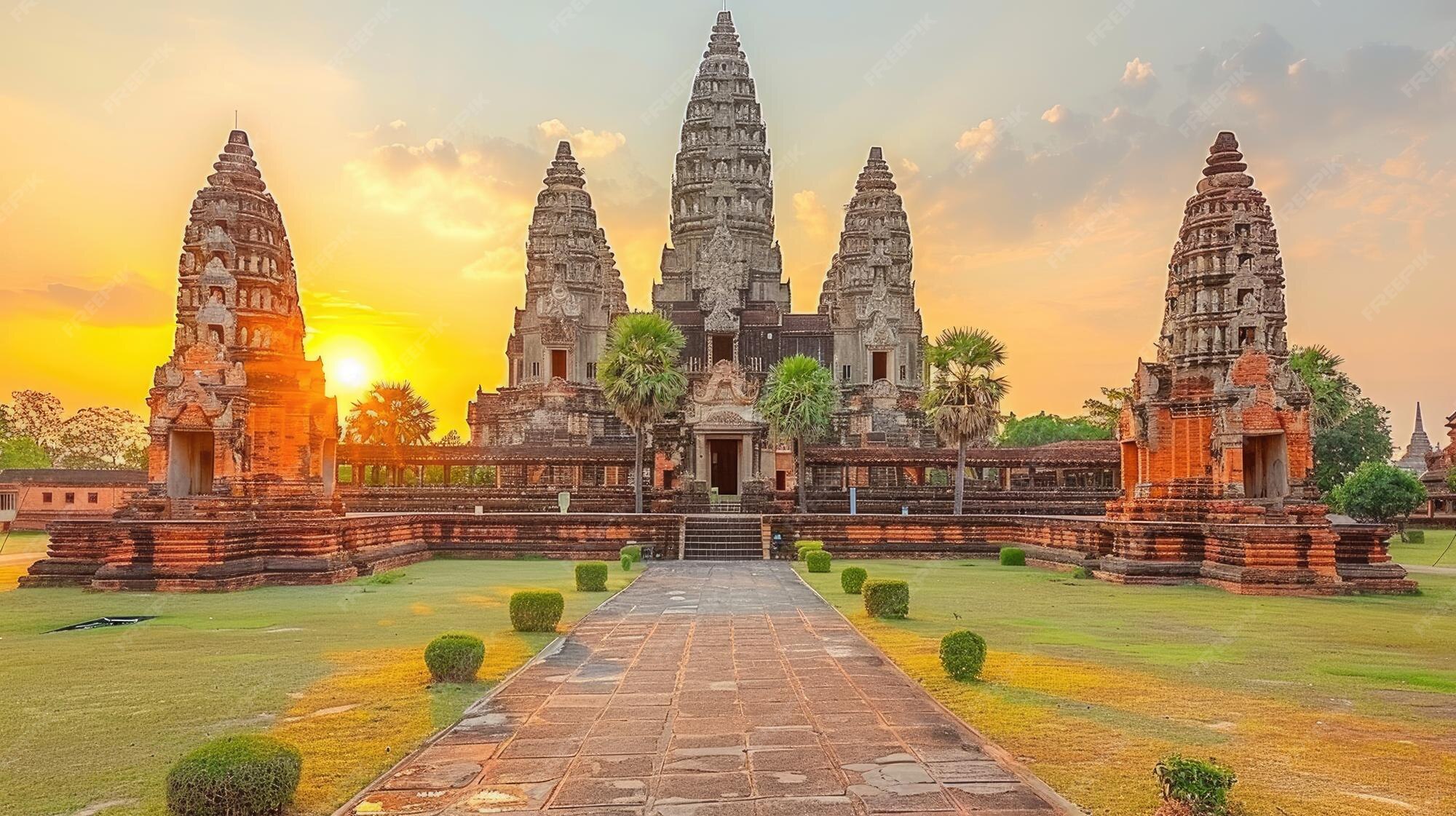Ayutthaya Historical Park Thailand: Just a short drive north of Bangkok, you’ll find Ayutthaya — the former capital of the Kingdom of Siam. This ancient city, founded in 1350, flourished for more than 400 years as a global trading centre. Later, in 1767, it fell to Burmese forces, marking the end of its golden age.
Today, the Ayutthaya Historical Park Thailand stands as a powerful reminder of that glorious past. Ruined palaces, temple complexes, and towering stupas still whisper stories of mystery, faith, and beauty. As you wander through the site, you can sense the deep connection between ancient history and modern Thailand.
Moreover, Ayutthaya is now a UNESCO World Heritage Site, and it remains a must-visit destination for travellers eager to experience the cultural heart of Thailand.
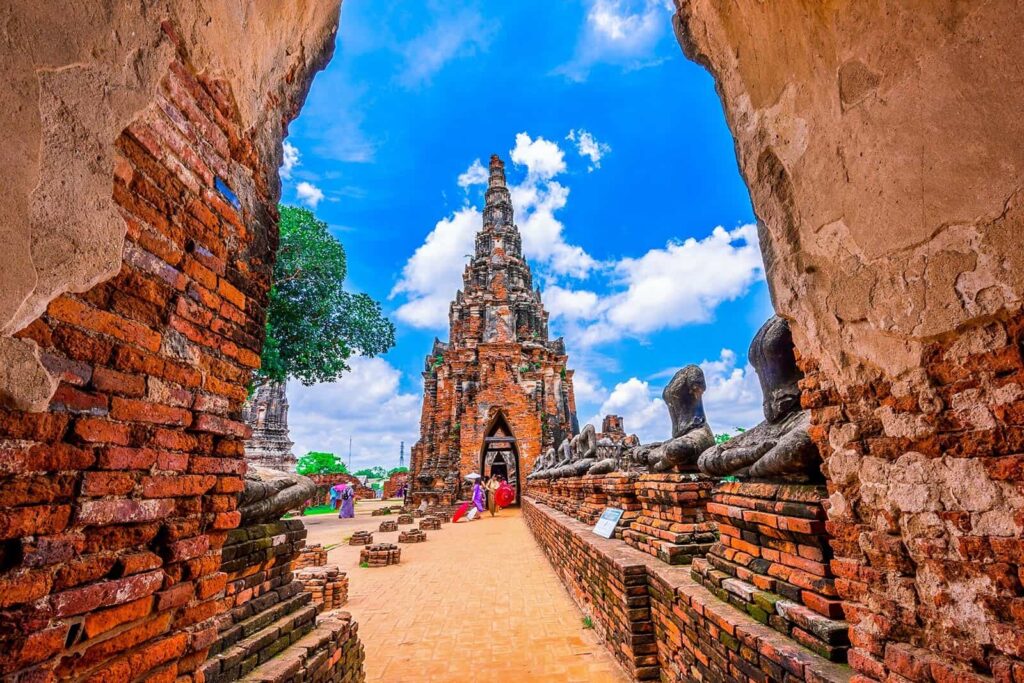
How to Get There: Ayutthaya Historical Park Thailand
📍 Location
Around 80 km north of Bangkok, this UNESCO World Heritage Site is filled with ancient temples and riverside ruins — making it a perfect day trip from the capital.
🚆 How to Get There
By Train: Depart from Bangkok’s Hua Lamphong Station for a scenic, budget-friendly ride through the countryside.
By Minivan or Bus: Head to Mo Chit Terminal, where frequent services offer a comfortable and quick trip to Ayutthaya.
Prefer more flexibility? You can also take a taxi or rent a car, allowing you to travel at your own pace and stop at interesting spots along the way.
⏰ Travel Time
Expect a 1.5 to 2-hour journey from Bangkok. Because of this, you can spend a full day exploring the ancient ruins and still return to the city by evening. It’s the perfect mix of adventure and convenience — ideal for any traveller.
Must-See Temples in Ayutthaya Historical Park Thailand
1. Wat Mahathat – The Iconic Buddha Head in Tree Roots
Wat Mahathat is perhaps the most photographed site in Ayutthaya, known for the serene Buddha head entwined in the roots of a Bodhi tree — a powerful symbol of nature reclaiming history. Built in the early Ayutthaya period, this temple once served as the religious heart of the kingdom and even housed sacred relics of the Buddha.
Visitors can explore elegant chedis, sandstone Buddha images, and of course, the iconic tree-wrapped head that defines the site. For the best experience, visit in the morning, when the light is soft and the crowds are fewer.
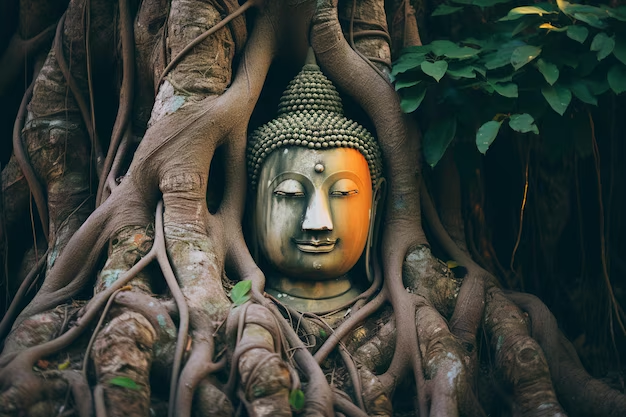
2. Wat Phra Si Sanphet – The Royal Temple
Once part of the royal palace grounds, Wat Phra Si Sanphet served as Ayutthaya’s most important spiritual and political temple, reserved only for royalty. The three towering chedis, standing side by side, are iconic symbols of ancient Thai architecture. They once held the ashes of Thai kings, marking it as a sacred royal site.
Former Use: Royal temple — no monks lived here
Ideal For: History lovers and photographers
3. Wat Chaiwatthanaram – Riverside Beauty
Wat Chaiwatthanaram is one of Ayutthaya’s most beautiful and best-preserved temples. Built on the west bank of the Chao Phraya River, this Khmer-style complex features a tall central prang surrounded by smaller towers, creating a perfectly balanced design.
At sunset, the temple glows golden as the light fades — a view that makes it a favourite spot for photographers. While exploring, you’ll see how its symmetry and riverside setting capture the peaceful spirit of ancient Thailand.
Location: West of the river, just outside the main city island.
Best View: Cross the river by boat for postcard-worthy photos and a peaceful view of the temple at dusk.
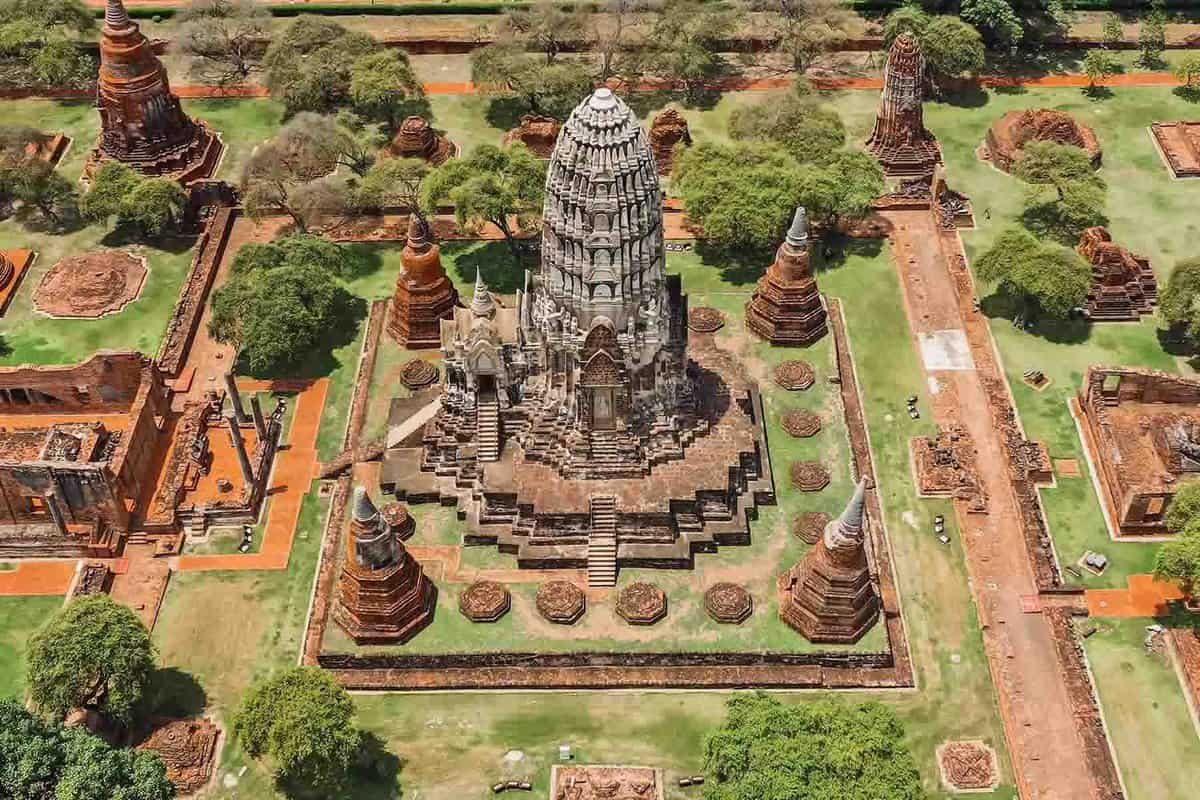
Explore Like a Local: Ayutthaya Historical Park Thailand
🚲 By Bicycle
Exploring Ayutthaya by bicycle is both scenic and flexible. Cycling lets you set your own pace and stop anytime to admire the ancient temple ruins. You’ll often pass through quiet lanes and riverside paths, which offer a closer view of local life. Altogether, it’s an active and relaxing way to explore the city.
🚤 By Boat
For a different view, take a boat cruise along the Chao Phraya River to see Ayutthaya’s riverside temples from the water. As you drift past, enjoy a peaceful escape and a unique perspective on the city’s historic beauty. This calm journey offers a welcome break from the busy streets.
🛺 By Tuk-Tuk
If you prefer comfort, hop on a tuk-tuk, one of Ayutthaya’s most convenient ways to travel between temples. These rides are affordable, fun, and full of local charm. Because of this, you can cover more sites in less time while soaking in the buzz of the city streets.
💡 Insider Tip
Many guesthouses and rental shops offer bikes for just 50–100 THB per day. That’s why cycling remains one of the best-value ways to explore Ayutthaya. It’s simple, sustainable, and a great way to connect with the city’s history and atmosphere.
Entry & Visitor Information
🏛️ Park Hours
The historical park is open daily from 8:00 AM to 6:00 PM, giving visitors plenty of time to explore its temples and ruins at a relaxed pace. If you arrive early, you’ll avoid the midday heat and enjoy peaceful surroundings — perfect for photos and quiet walks.
💸 Entry Fee
For most temples, foreign visitors pay around 50 THB per site. In addition, multi-temple passes are available, making it easy and affordable to see more in a single day. This option lets you experience more of the park while saving both time and money.
📷 Photography
Photography is welcome throughout the park, so bring your camera or phone to capture the beauty around you. If you plan to fly a drone, remember that it requires a permit. By checking local rules in advance, you can avoid any issues and focus on creating great memories instead.
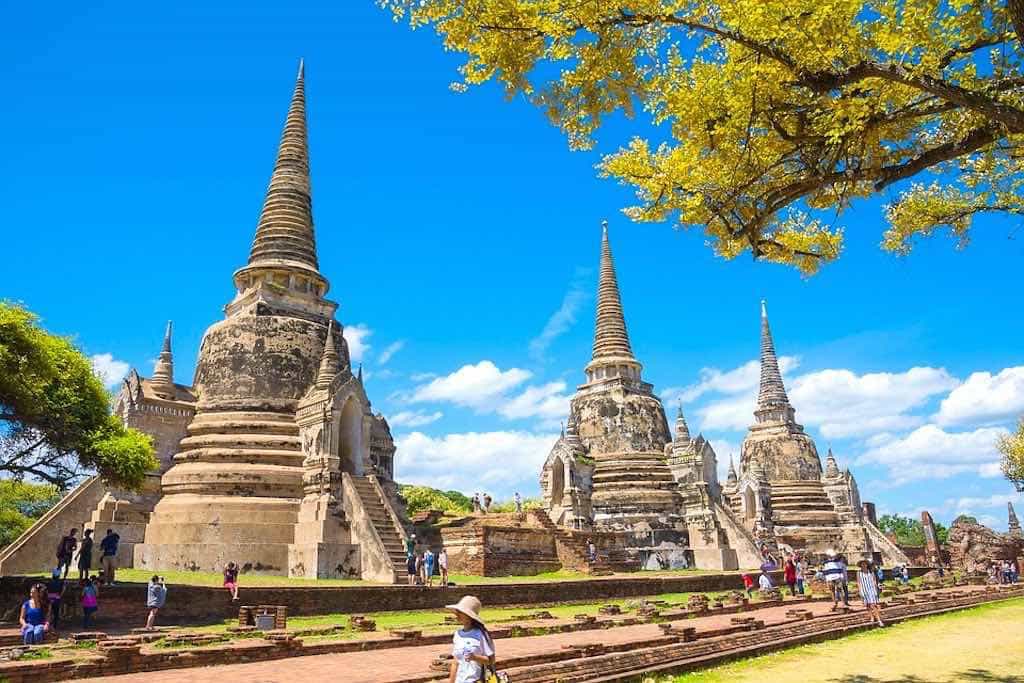
Best Time to Visit
🌤️ Dry Season — November to February
This is the best time to visit Ayutthaya Historical Park Thailand. The weather stays cool and pleasant, perfect for sightseeing and outdoor adventures. In fact, you’ll find clear skies, gentle sunshine, and the ideal conditions for both photography and relaxation.
☀️ Shoulder Season — March to May
During this period, temperatures rise, and the days feel warmer. Even so, crowds begin to thin out, giving you more space to explore ancient temples and markets. As a result, it’s a great time to enjoy popular attractions without feeling rushed or crowded.
🌧️ Rainy Season — June to October
Meanwhile, the rainy season brings lush greenery and a refreshing atmosphere. Although short showers may appear, they rarely last long. Therefore, it’s a wonderful time for travellers who love peace, nature, and fewer tourists.
💡 Travel Tip
Don’t forget to bring sunscreen, water, and light, breathable clothing — Ayutthaya can still get hot, even during the cooler months.
Cultural Etiquette & Tips
When visiting temples in Thailand, it’s important to respect local customs. To begin with, wear modest clothing that covers your shoulders and knees. This simple gesture shows appreciation for the sacred setting.
Also, avoid climbing on temple ruins or Buddha statues. These sites are holy places, and touching or standing on them is considered disrespectful.
Before entering an active worship area, remove your shoes. This small act is a traditional sign of purity and respect that locals value deeply.
To connect warmly with people, greet them with a polite “wai” — palms together and a gentle bow. As a result, your kindness and courtesy will be warmly appreciated everywhere you go.
Final Thoughts: Ayutthaya’s Timeless Charm
Ayutthaya Historical Park Thailand is more than a collection of ruins — it’s a living museum that shares the story of Thailand’s royal and spiritual past. Each temple and statue reflects centuries of faith, art, and power, reminding visitors of the city’s golden age.
For history lovers and culture seekers alike, Ayutthaya offers a deep connection to a once-mighty kingdom whose legacy still shapes modern Thai identity. The park’s peaceful atmosphere, meanwhile, makes it easy to imagine the grandeur that once filled these ancient grounds.
You can explore by bike, admire the sacred stonework, or rest beneath centuries-old trees. As a result, the past seems to come alive in one of Thailand’s most inspiring heritage sites.
